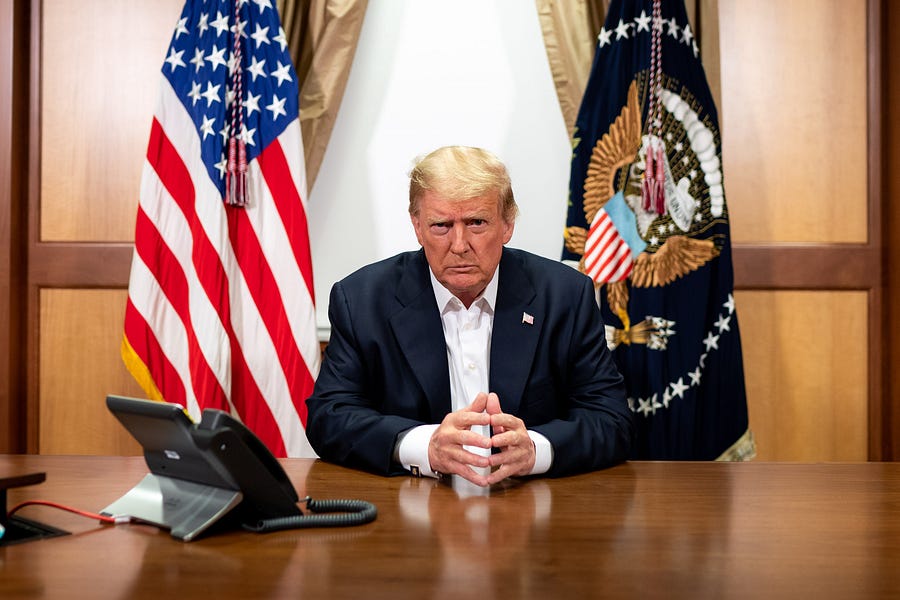Days after testing positive for the novel coronavirus, President Trump may emerge from Walter Reed Medical Center relatively unscathed from the pandemic that has killed upward of 209,000 Americans. In a recorded speech shared to Twitter, the president thanked the nurses and doctors who are overseeing his treatment and assured followers that he “learned a lot about COVID” during his stay.
Although Trump seems to be on an encouraging path to recovery, that path has been anything but straightforward. White House Chief of Staff Mark Meadows said Saturday that the president’s doctors had been “very concerned” about Trump’s deteriorating condition, and cautioned that “he’s not out of the woods for the next 48 hours or so.” The president’s blood oxygen level has reportedly dropped below the normal range at least twice since his positive test, requiring additional oxygen and steroid therapy. Trump’s ability to carry out the duties and powers of the presidency during his hospitalization remain unknown, but his bout with the deadly virus illuminated underlying problems with our government that experts have pointed to for years. The fact remains: We are woefully unprepared for a crisis of presidential succession.
In 2009, the AEI-Brookings Continuity of Government Commission—which formed in response to the terrorist attacks of 9/11—highlighted massive gaps in the country’s contingency plans in the event that a disaster kills or incapacitates several individuals in the line to be president at the same time. Eleven years later, Congress has yet to make any meaningful legislative changes to address this problem.
The Continuity of the Presidency report opens with a thought experiment. Imagine a scenario in which an al-Qaeda sympathizer diverts a plane into the Capitol building, killing and wounding many (as well as stirring up a general commotion). The president, vice president, speaker of the House, and president pro tempore of the Senate are nowhere to be found. Should the secretary of agriculture assume the presidency quickly to avoid a power vacuum? What if a higher-ranking official resurfaces unharmed?
This anecdote lays out an extreme case, but as people in Trump’s orbit receive positive COVID-19 test results, it’s not difficult to imagine a scenario in which the virus debilitates more than one individual in the presidential succession line simultaneously. “You could imagine a terrorist attack—a very immediate and mass attack—where many people in the line are affected all at once.” said John Fortier, who was executive director of the Continuity of Government Commission, which has since disbanded. “I think it actually has more in common with that scenario that maybe we thought.”
After the assassination of President John F. Kennedy in 1963, the 25th Amendment established a process by which the president can temporarily cede his powers, or be stripped of them, in the event of debilitating health concerns. But the 25th Amendment and the Presidential Succession Act leave many questions unanswered.
For example, what if there is more than one person in the line of succession who is affected, and the incapacitation is temporary?, “People think that this line of succession is always very easy. You go from president, to vice president, to speaker, and down the line. In the case of disability, where the president and vice president may recover, it becomes more difficult,” Fortier told The Dispatch. And history shows us that presidents have the tendency to mask serious health concerns from the public, anticipating possible political and national security fallout.
Presidents have voluntarily signed over presidential powers to their vice presidents on a temporary basis, but examples of this exchange are far and few between and typically for elective surgeries. Far more often, presidents avoid such a step—even since the passage of the 25th Amendment clarified the process. Ronald Reagan, for example, continued to serve as president after his shooting and through a grueling recovery process.
In a situation in which the president is unable to perform his duties but unwilling to cede his power to the vice president, the Cabinet can invoke the involuntary removal mechanism. Section IV of the 25th Amendment grants Cabinet secretaries the ability to relieve the president of his position should he become incapacitated. The White House Medical Unit helps them make that call.
“It [would] be complicated with people recovering at various times and reclaiming the presidency in this so-called bumping procedure, where the speaker or president pro tem could bump out a Cabinet member. The sickness disability of the pandemic lends itself to that, where people might not only be unable to serve for a while, but then they do recover,” said Fortier, referring to the controversial bumping provision in the Presidential Succession Act, which allows those higher in line of succession to take over the presidency from a lower-ranking official who has already become acting president.
Another cause for concern—which has been at the forefront of scholarly criticism about presidential succession since the 18th century—is the inclusion of congressional leaders in the order of succession. Under President Harry Truman, the Presidential Succession Act of 1947 reintroduced the speaker of the House and the president pro tem back into the line of succession—a move vehemently opposed by James Madison in 1792. When the Founders debated the first succession act, Madison argued that the Constitution allowed Congress to establish a line of succession composed of executive branch members alone. Throwing lawmakers into the mix constituted a separation of powers concern, particularly when that individual was of a different party. If President Trump and Vice President Mike Pence became unable to discharge presidential tasks, House Speaker Nancy Pelosi could assume the role—in all likelihood setting off a nationwide constitutional crisis.
To further complicate matters, the country is in the final stages of a contentious election in which more than 1 million Americans have already voted. As we enter the uncharted territory of Election Day amid a pandemic, several possible scenarios could trigger a democratic emergency. The president and/or vice president could die or become incapacitated immediately before the election, after Election Day but before electors cast their vote, or after a victor is declared but before inauguration. Each contingency, theoretically, would generate a different response.
“In 1972, Eagleton was made the nominee by the Democratic Convention before having to leave and the Democratic National Committee—which basically had the same types of rules they do now—put Sargent Shriver on the ticket. It was early enough that they could reprint ballots,” said Fortier. “I think people are rightly asking now, what happens now that they voting has started, now that many ballots have gone out.”
In some ways, the Electoral College could be an asset in ensuring a smooth election, even in the event of disaster. Because the party has the power to pick a replacement candidate, the Republican National Committee could simply create a new ticket and direct Republican electors to vote accordingly to account for votes that have already been cast. “You see these gubernatorial and senatorial elections where someone dies late in the game and it’s always hard to figure out, well, what do you do with all the ballots that have been cast? It’s complicated,” said Fortier. “The thing about the presidential ballot that is somewhat helpful in this case is that you have electors and you vote for the electors, even though in most states, you don’t see their names on the ballot. A Republican slate of electors would still be elected.”
One caveat: Several states have passed laws to bind their electors to voting for individuals on the ticket, and might bar their electors from voting for a replacement candidate. The Supreme Court upheld such legislation in Chiafalo v. Washington back in July.
In one stark scenario, the Electoral College could select a ticket that never appeared on a ballot. If the president and/or vice president were to die after the November vote but before electors choose the president, the party can still direct them to vote for the replacement candidate or candidates. “The party has the ability to pick the nominee, so there’s not a legal problem as much as there’s a legitimacy problem,” explained Fortier.
As Congress fails to address pressing presidential succession concerns with each passing year, the odds of a smooth transfer of executive power in the event of an emergency grow worse. President Trump’s illness brought to light the multitude of scenarios that could unravel American leadership swiftly.
Photograph by Tia Dufour/White House/Getty Images.









Please note that we at The Dispatch hold ourselves, our work, and our commenters to a higher standard than other places on the internet. We welcome comments that foster genuine debate or discussion—including comments critical of us or our work—but responses that include ad hominem attacks on fellow Dispatch members or are intended to stoke fear and anger may be moderated.